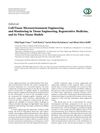 5 citations,
May 2022 in “Biomedicines”
5 citations,
May 2022 in “Biomedicines” Botryococcus terribilis and its compounds may promote hair growth and improve hair health.
 1 citations,
March 2023 in “bioRxiv (Cold Spring Harbor Laboratory)”
1 citations,
March 2023 in “bioRxiv (Cold Spring Harbor Laboratory)” Skin cell types develop when specific genes are turned on by removing certain chemical tags from DNA.
 1 citations,
January 2018 in “Stem cell biology and regenerative medicine”
1 citations,
January 2018 in “Stem cell biology and regenerative medicine” DNA methylation is essential for skin and hair follicle development, and could be a target for treating skin diseases.
 20 citations,
January 2016 in “Open Journal of Endocrine and Metabolic Diseases”
20 citations,
January 2016 in “Open Journal of Endocrine and Metabolic Diseases” PCOS affects fertility and is linked to obesity and menstrual irregularities; lifestyle changes are recommended for treatment.
 7 citations,
January 2015 in “Case reports in endocrinology”
7 citations,
January 2015 in “Case reports in endocrinology” The document concludes that HAIR-AN syndrome should be considered when a patient shows severe hyperandrogenism and insulin resistance after excluding tumors.
 July 2015 in “Cambridge University Press eBooks”
July 2015 in “Cambridge University Press eBooks” Androgens like testosterone affect skin health and can lead to conditions such as acne and hair loss, with various treatments available.
 25 citations,
March 2017 in “Experimental Dermatology”
25 citations,
March 2017 in “Experimental Dermatology” The document concludes that understanding hair follicles requires more research using computational methods and an integrative approach, considering the current limitations in hair treatment products.
 February 2012 in “InTech eBooks”
February 2012 in “InTech eBooks” PCOS increases the risk of heart disease and type 2 diabetes in women.
 7 citations,
December 2020 in “Pharmaceutics”
7 citations,
December 2020 in “Pharmaceutics” A mix of tocopherol acetate and L-menthol helps grow hair better than using them separately or using minoxidil.

There are many ways to treat Polycystic Ovary Syndrome, including lifestyle changes, surgery, and various medications, but more research is needed for better treatments.
 October 2020 in “International Journal of Research in Dermatology”
October 2020 in “International Journal of Research in Dermatology” The review suggests more research is needed to understand Frontal fibrosing alopecia, a condition causing hairline recession in postmenopausal women.
 December 2024 in “Molecules”
December 2024 in “Molecules” Bovine milk-derived exosomes may improve skin, hair, gut, brain, and bone health.
 December 2024 in “Frontiers in Veterinary Science”
December 2024 in “Frontiers in Veterinary Science” Dorper sheep's wool shedding is linked to specific genes and pathways, which may help understand human hair growth.
 10 citations,
September 2022 in “Advanced Healthcare Materials”
10 citations,
September 2022 in “Advanced Healthcare Materials” Current methods can't fully recreate skin and its features, and more research is needed for clinical use.
 August 2019 in “Journal of Investigative Dermatology”
August 2019 in “Journal of Investigative Dermatology” Frog skin cells need the protein desmoplakin for proper development and cell layer formation.
 6 citations,
January 2019 in “Dermatology Research and Practice”
6 citations,
January 2019 in “Dermatology Research and Practice” Many survivors of Stevens-Johnson Syndrome and Toxic Epidermal Necrolysis in Togo suffer long-term eye and skin problems.
 March 2014 in “Journal of The American Academy of Dermatology”
March 2014 in “Journal of The American Academy of Dermatology” The document lists various dermatology topics, treatments, and diagnostic methods.
305 citations,
March 2008 in “AJP Endocrinology and Metabolism” SSAT is a key enzyme affecting cell growth and metabolism, with potential but risky use in disease treatment.
216 citations,
May 2003 in “Journal of Investigative Dermatology” Glycerol is essential for skin hydration in mice without sebaceous glands.
 1 citations,
January 2022 in “Stem cell biology and regenerative medicine”
1 citations,
January 2022 in “Stem cell biology and regenerative medicine” New methods to test hair growth treatments have been developed.
 2 citations,
July 2023 in “International Journal of Molecular Sciences”
2 citations,
July 2023 in “International Journal of Molecular Sciences” BFNB could be a promising treatment for hair growth.
June 2024 in “Regenerative Therapy” Exosomes from stem cells may help rejuvenate skin and regrow hair, but more research is needed.
 1 citations,
October 2023 in “Life science alliance”
1 citations,
October 2023 in “Life science alliance” Pantethine may boost the immune system's ability to fight sarcoma.
 1 citations,
January 2022 in “Journal of Biosciences and Medicines”
1 citations,
January 2022 in “Journal of Biosciences and Medicines” Understanding how androgens and their receptors work can lead to improved treatments for skin diseases.
 4 citations,
January 2014 in “BioMed Research International”
4 citations,
January 2014 in “BioMed Research International” Engineering the cell microenvironment is key for advancing tissue engineering and regenerative medicine.
 September 2023 in “JEADV Clinical Practice”
September 2023 in “JEADV Clinical Practice” People with common hair loss conditions may have a higher risk of heart disease and related health issues.
1 citations,
May 2024 in “Pharmaceutics” Hemp is a promising ingredient for skin products due to its healing and soothing properties.
 1 citations,
July 2022 in “Plant Cell, Tissue and Organ Culture (PCTOC)”
1 citations,
July 2022 in “Plant Cell, Tissue and Organ Culture (PCTOC)” The study found that in Eclipta prostrata roots, coumestans come from acetate and shikimate pathways, and phenylpropanoid is made only through the shikimate pathway.
 112 citations,
May 2019 in “Pharmacological Research”
112 citations,
May 2019 in “Pharmacological Research” Lignans and neolignans from plants may help protect against various health issues, including cancer and heart disease.
 125 citations,
September 2001 in “The FASEB Journal”
125 citations,
September 2001 in “The FASEB Journal” Stress can cause hair loss by negatively affecting hair follicles and this effect might be reversed with specific treatments.

























